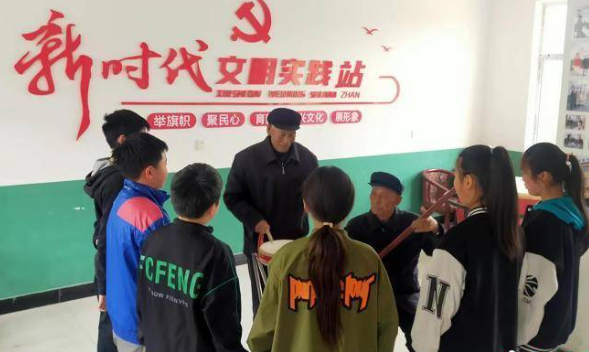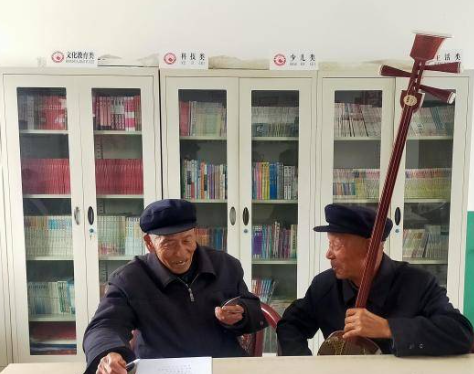Tayayi Village, Tayayi Township, Laiyuan County, Hebei Province: "Inheriting" the New Fashion of Xihe Drums
Put on the drum stand, tune the three strings, the drums start, the three strings move... On the 5th, at the New Era Civilization Practice Station in Tayayi Village, Tayayi Township, Laiyuan County, Hebei Province, Jin You and Wang Shumin, two octogenarians The Xihe drum performance officially opened.

Gold has a clean and tidy strumming and passionate singing; Wang Shumin's strumming and plucking are calm and cheerful, the rhythm is lively, and the two cooperate like clouds and water. At the end of the song, the two old people took their seats and waited for the arrival of the first batch of "little students" that day.

It is understood that the new era civilization practice station in the village was completed last year. According to the needs of the villagers, the government allocated funds to purchase cultural and entertainment equipment, which boosted the spirit of the two old people who had been partners as early as seventeen or eighteen years old. Come here to learn skills in your spare time.
"I grew up listening to two old people talking about stories. At that time, when the drum sounded, people from Shiliba Village came to listen to the excitement. The second old man was a big star." said Liu Wenfeng, secretary of the Party branch of Tayayi Village.
Xihe drums are also known as "Dagu Book", "Xihe Diao", "Plum Blossom Diao" and "Xianzi Drum", which are mainly spread in Hebei and surrounding areas. During the reign of Qianlong in the Qing Dynasty, Liu Chuanjing, Zhao Chuanbi and Wang Lu in Baoding created the first wooden drum and Xianzishu to perform together. It spread to the wooden drum artist Ma Sanfeng, and gradually formed the Xihe drum. During the performance, one person raps and sings by striking copper plates and book drums, and another person plays the sanxian accompaniment. In 2006, Xihe drum was included in the first batch of national intangible cultural heritage list.
According to Wang Weiwei, a publicity member of Tayayi Township, the rural revitalization strategy has provided rich creative soil for rural grassroots artists. In recent years, the two old people not only insisted on singing traditional songs such as "Yang Jia Jiang", "Hu Jia Jiang" and "The Legend of Sui and Tang Dynasties", but also compiled "Endeavour in the 14th Five-Year Plan", "A New Chapter on Rural Revitalization" and "Anti-epidemic" based on their personal experience. Song" and other new scripts to publicize and advocate new rural customs.
"Grandpa, what are we learning today?" On that day, near noon, six children who had just finished their online classes ran over and surrounded the two elderly people.
"When the drums sound, the eyes must follow the hands, the eyes must be wise, the gestures are upward, and the T-steps under the feet must be firm." Jinyou explained the essentials of the movements to the children, and then demonstrated and sang a paragraph: "A good policy for poverty alleviation, Rural revitalization has a new look, moving to a new house, living in a new house, free of medical care, guaranteed, and a happy life for thousands of years."
"I hope to pass on what I have learned in my life to the children, so that the art of Xihe drum can play a greater role in the construction of new rural areas." Huang Jinyou said with a smile.
According to Liu Wenfeng, at present, the village has organized 5 literary and artistic volunteer service teams, including calligraphy, square dance, erhu, and Xihe drum, to carry out theatrical performances during holidays and slack seasons to enrich the cultural life of the masses. "It is planned to open a Xihe drum interest class in Tayayi Central Primary School, so that more children can experience and learn traditional Chinese art at close range."
Sun Yi, member of the Standing Committee of the Laiyuan County Party Committee and Minister of Propaganda, said that in recent years, the county has continued to promote culture to the countryside, dig deep into grass-roots literature and art workers, and built 165 stations for civilized practice (institutions) in the new era. culture" change.
 渝公网安备 50010702504639号
渝公网安备 50010702504639号